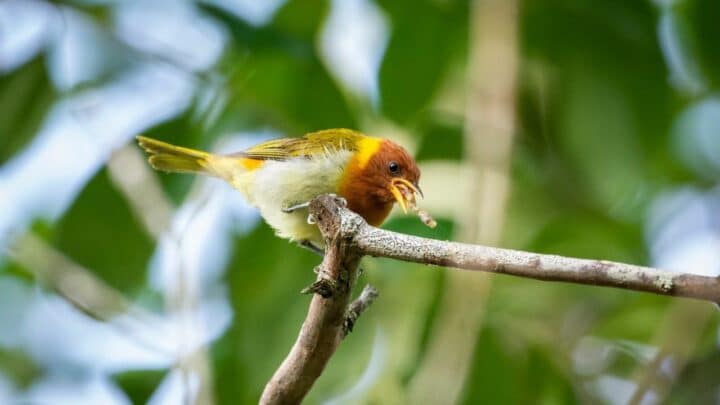Every bird has a particular diet, and the American Robin has a taste for earthworms. A migratory songbird member of the thrush family, the American Robin, can be found across North America.
Birds of prey look down from aloft to find prey, but robins have their own way of finding food. They will peer down at the ground from a tree, hop about in the grass, and use their keen eyesight to find a worm.
However, their site is not their only means of finding food.
They have some peculiar habits that help them find their prey that aid their eyesight when they hunt. Their ability to fly is not inclusive to American Robins because all birds can fly use this skill to hunt food.
Every bird species have traits that help them find food, and robins have a couple of their own.
How Robins Find Worms
Aside from their highly-developed sight, robins can hear worms in the ground before they see them. This acute sense of hearing, along with excellent vision, is how robins find worms. Robins can also taste the soil of a location to determine if there are worm castings in the ground, indicating active worms.
American Robins Use All of their Senses to Find Worms
It is easy to understand that birds, including American robins, use their highly developed sense of sight to find food. However, Robins can hear worms in the ground and will snatch them as they emerge.
Although they do not seem to have a sense of smell, they seem to have a sense of taste. Robins will peck at the earth where they land, searching for food by tasting the dirt for worm spores.
Any area with one worm will have many of them, and their waste will mix with the earth. Robins can taste the waste that worms leave and know that they are searching for dinner in the right area of your yard.
There is a theory that robins can feel the vibrations of worms in the ground and hear them, which may be so.
Eating Behaviors of the American Robin
Bird watchers have noted a particular little move made by Robins just before they grab a worm. Robins cock their heads to the side like they are listening to the ground, then pounce.
Some think that they are testing the health of the worm they are about to devour. Others, however, believe that it is a defense motion and that the robin is listening for threats before getting involved with its meal.
This theory makes sense because a bird on the ground is much easier prey than in flight. And we are all less attentive when we are occupied with a meal.
Both theories are viable, and robins are not giving up their secrets just yet. However, it is a characteristic behavior of the American robin.
What Robins Eat with their Worms
Robins have a diet beyond worms and eat caterpillars, grasshoppers, grubs, termites, crickets, spiders, insect larvae, beetles, and various other insects. That is the protein portion of their meal.
Robins will eat raspberries, blueberries, juniper berries, honeysuckle, and holly to supplement their buggy, wormy diet. They will also eat from fruit-bearing trees like hawthorn, cherry, dogwood, and crabapples.
If you want robins in your yard, then plant trees that will attract them. In that case, you will make your landscape attractive to robins and other birds.
Robins and other birds you attract may eat some fruit from your trees; however, they also eat insects.
A Robin’s Diet Changes with the Seasons
The diet of Robins changes with the seasons. During spring and the early summer months, they add calcium-rich foods like insects and mollusks to their diets that help them form eggs.
Later in the summer and into the cooler months of fall, they add vegetables and fruit to their diet as they become available. Finally, in the cold months of winter, robins will forage for whatever they can find, just as other birds do.
If you want the robins that stay with you year-round to have food in the winter, offer them fruits and vegetables in a feeder. They will appreciate it, as they do not care for commercial bird feed.
If robins cannot find food in the area, they’ll migrate in search of food. So, if you want them to stay around all winter, feed them and provide shelter so that they can survive where you live.
Frequently Asked Questions about How Robins Find Worms
Do Robins migrate?
Robins will stay put if food is available, although many will migrate to northern Canada to breed.
Robins Use All of their Senses to Find Worms
Using their acute sense of sight and hearing, as well as smell, taste, and the feel of the dirt under their feet, robins can find worms.
Whether they spot food from the air or while pecking their way across your yard, robins use every sense they have to find worms.
It takes about 14 feet of earthworms daily to sustain a robin, so they start early in the day to get the amount of food they need to stay alive and reproduce.


